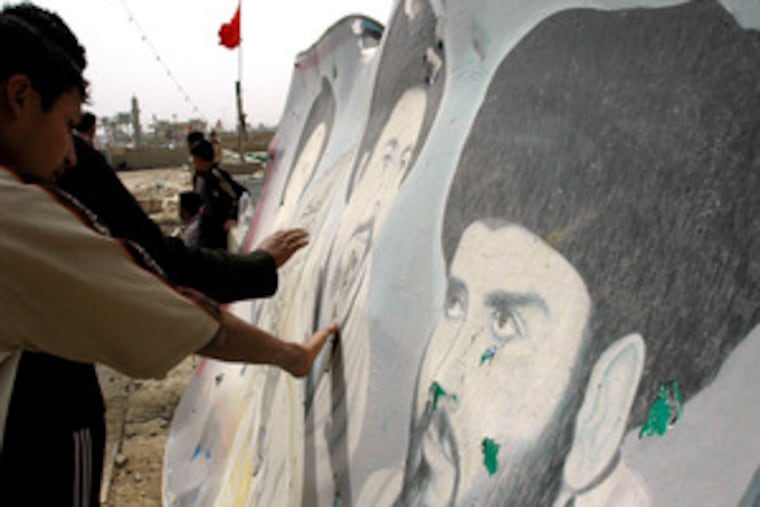Deaths fuel rage in Iraq
With more than 500 killed in the last week, Muqtada al-Sadr urged a huge anti-U.S. protest April 9.

BAGHDAD - Suicide bombers and militiamen fought back ferociously in the seventh week of the Baghdad security crackdown, killing at least 508 people in the last six days, but the Iraqi government vowed yesterday it would win the race against terrorism and despair.
As the deadly week drew to an end on the Muslim day of rest and prayer, radical cleric Muqtada al-Sadr blamed the United States for the violence and called for a huge anti-American demonstration April 9, the fourth anniversary of the fall of Baghdad.
Marketplaces in Baghdad, Tal Afar and Khalis stood in ruins. Cleanup crews shoveled broken glass and debris into wheelbarrows in bloodstained streets. Bomb victims in wooden coffins were hoisted atop cars and vans for the trip south for burial in Shiites' holy city of Najaf.
In a sign of how deeply officials were shaken by the carnage, a top aide to Prime Minister Nouri al-Maliki, Sami al-Askari, pledged that the government would not relent in efforts to curb violence.
"There is a race between the government and the terrorists who are trying to make people reach the level of despair," Askari said. "But the government is doing its best to defeat terrorists, and it definitely will not be affected by these bombings."
The new U.S. commander in Iraq, Gen. David Petraeus, issued a statement blaming al-Qaeda in Iraq for the week's first major suicide attack, a twin truck bombing that killed 80 people and wounded 185 at markets in Tal Afar, in the far northwest of the country.
He said al-Qaeda's leaders "once again displayed their total disregard for human life, carrying out barbaric actions against innocent Iraqi citizens in an effort to reignite sectarian violence and to undermine recent Iraqi and coalition successes in improving security in Baghdad."
The Pentagon ratcheted up its rhetoric against Iraq's Sunni Arab insurgents, condemning the recent use of chlorine gas as a weapon. It called that the first use of a poison gas against Iraqis since Saddam Hussein ordered mustard-gas attacks on ethnic Kurds in northern Iraq nearly 20 years ago.
Insurgents in their Anbar province stronghold have carried out or unsuccessfully launched at least eight attacks using chlorine gas since Jan. 28, when 16 people were killed in Ramadi, the provincial capital. Al-Qaeda-linked insurgents were believed to have turned to the weapon to strike terror among fellow Sunnis who have sided with U.S. forces.
While President Bush, the U.S. military and U.S. diplomats in Iraq have expressed cautious hope about the crackdown on violence that began Feb. 14 in Baghdad, Anbar province, and regions surrounding the capital, the ease with which suspected al-Qaeda suicide bombers have continued striking Shiite targets must be deeply disconcerting.
Only about a third of the additional 30,000 soldiers and Marines that Bush pledged for the security drive are in the country, with the full deployment not expected until June.
Sadr's statement was his first since March 16, when he urged supporters to resist U.S. forces through peaceful means. U.S. and Iraqi officials say Sadr remains in Iran, sitting out the security crackdown, but aides have told the Associated Press he has returned to Najaf.
His latest declaration was read to worshipers during Friday prayers at a mosque in Kufa, a twin city to Najaf where Sadr frequently led the ritual, and in Baghdad's Shiite enclave of Sadr City.
"I renew my call for the occupier to leave our land," he said in the statement, a copy of which was obtained by the AP. "The departure of the occupier will mean stability for Iraq, victory for Islam and peace and defeat for terrorism and infidels."
Sadr, whose Mahdi Army militiamen fought U.S. troops in 2004 but generally have cooperated with the current U.S.-Iraqi security push in Baghdad, blamed the presence of U.S. forces in Iraq for the rising violence, lack of services and sectarian bloodshed.
"You, oppressed people of Iraq, let the entire world hear your voice that you reject occupation, destruction and terrorism," he said in calling for the April 9 demonstration.
The U.S. military said one soldier was killed and a second wounded Thursday during a patrol in southern Baghdad, raising to at least 3,245 the number of U.S. military personnel who have died since the war began in 2003, according to an AP count.
Iraqi police said 26 people were slain or found dead nationwide yesterday, a huge drop from the 181 killed Thursday, most in suicide attacks on markets in Khalis, 50 miles north of Baghdad, and the Shaab neighborhood in the capital's north.